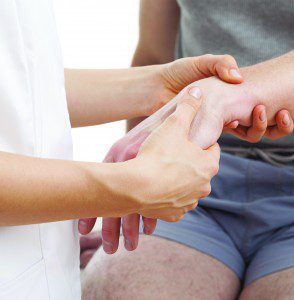By Toni Eatros, MS, Dipl Ac, AP
 What is Carpal Tunnel Syndrome (CTS)?
What is Carpal Tunnel Syndrome (CTS)?
Carpal Tunnel Syndrome is a condition in which the median nerve in the arm/wrist becomes irritated and swells, usually due to repetitive motion. As the nerve swells, it causes pressure in the carpal (wrist) tunnel. This increased pressure then further irritates the median nerve. This causes more swelling and pain, and the condition typically worsens. CTS is considered to be a severe example of Repetitive Strain Injury.
What structures form the tunnel?
Across the back of the wrist, eight small, irregular bones (called carpals) form a letter “C.” Closing the circle on the innerside of the wrist is a tough ligament, called the transverse carpal ligament.
What goes through this tunnel?
Nine tendons pass through this narrow tunnel along with the soft median nerve. This tunnel is about the size of your pinky.
What are symptoms of Carpal
Tunnel Syndrome?
Typical symptoms of CTS include pain in the wrist that radiates into the hand and sometimes into the forearm; numbness and tingling in the thumb, index, and middle fingers; and weakness of the hand.
What causes Carpal Tunnel Syndrome?
CTS occurs more frequently in workers whose tasks include repetitive hand movements, including computer operators.
What are the statistics?
According to the Bureau of Labor Statistics, comparing median days missed from work among major disabling injuries and illnesses, median days away from work were highest for Carpal Tunnel Syndrome.
According to the National Institute of Occupational Safety and Health the average Carpal Tunnel Syndrome injury costs approximately $4,000 in benefits and rehabilitation per patient. If surgical intervention is required, the costs rise to more than $20,000 per patient.
What are common treatments for
Carpal Tunnel Syndrome?
Initially, rest and wearing a wrist splint is tried. Work stations are analyzed to be sure the ergonomics are appropriate for the individual.
NSAID’s are generally prescribed for musculoskeletal disorders of the arm, including shoulders, elbows, and wrists. NSAID’s [such as Motrin (Ibuprofen) and Voltaren (Diclofenac)] treat pain of mild to moderate intensity, and are most effective to reduce inflammation and swelling.
Though effective, these drugs cause serious side effects such as ulcers, gastrointestinal bleeding, ringing in the ears, blurred vision, dizziness and headache.
Furthermore, the newer NSAID’s, also known as Cox-2 inhibitors [such as Celebrex (Celecoxib)], are associated with significantly higher risk of cardiovascular events, including heart attack and stroke. Therefore, practitioners and patients must evaluate the potential benefit versus risk before prescribing and taking these drugs.
In short, it is important to remember that while drugs offer reliable and potent symptomatic pain relief, they should be used only if and when needed. Frequent use and abuse leads to unnecessary side effects and complications.
Direct steroid injection into the carpal tunnel is another treatment often used. After 2-4 months, between 65% – 90% of patients can be expected to have recurrence of symptoms.
About 40% of CTS cases opt for carpal tunnel surgery to release the transverse carpal ligament. There is usually a 2-3 moth period of rehabilitation required after this procedure.
Are there any less invasive treatment methods available?
There are several other options for treatment available for CTS. These methods, especially when used at the onset of CTS, can be very effective in eliminating the pain and inflammation associated with Carpal Tunnel Syndrome.
Acupuncture can be effectively used. The decrease in pain is usually noticeable within minutes of the start of treatment. Laser acupuncture is also sometimes used. The laser is thought to have an anti-inflammatory effect, may increase serotonin levels and promote pain relief. The laser treatment is completely non-invasive and pain free.
Auricular Medicine is very effective at treating Carpal Tunnel Syndrome. Ear seeds are applied to the front and back of the ear at specific locations corresponding to the wrist. These seeds remain in place for up to one week. Periodic squeezing of the seeds lead to a decrease in inflammation, a decrease in pain,
an increase in strength, and an increase in wrist flexibility. It seems crazy, but it actually works spectacularly. To read more information about Auricular Medicine, read the articles in the December 2014 and February 2015 of the SW Florida Health & Wellness Magazine.
Sometimes Chinese herbs are used to speed healing. Evergreen Herbs has a formula, called Arm Support, that is an excellent formula for treating all wrist ailments. Disorders of the arms are usually characterized by swelling, inflammation, pain, decreased range of motion with movement difficulty, and in severe cases, atrophy of the muscles and soft tissues. To successfully treat this condition, herbs are used to activate qi and blood circulation, dispel qi and blood stagnation, open channels and collaterals, and relieve pain.
Optimal treatment requires integrative use of herbs, acupuncture, auricular medicine and laser therapies. These therapies work together to tonify underlying deficiencies, strengthen the body, and facilitate recovery from chronic pain. TCM pain management targets both the symptom and the cause of pain, and as such, often achieves immediate and long-term success. Furthermore, TCM pain management is often associated with few or no side effects.
Acupuncture & Natural Health Solutions is proud to offer this combination of services, providing maximum healing and pain relief. The longer you wait, the more difficult it is to treat. Don’t wait another day, call now, 239-260-4566 or schedule online at www.AcupunctureSolutionsOnline.com.









